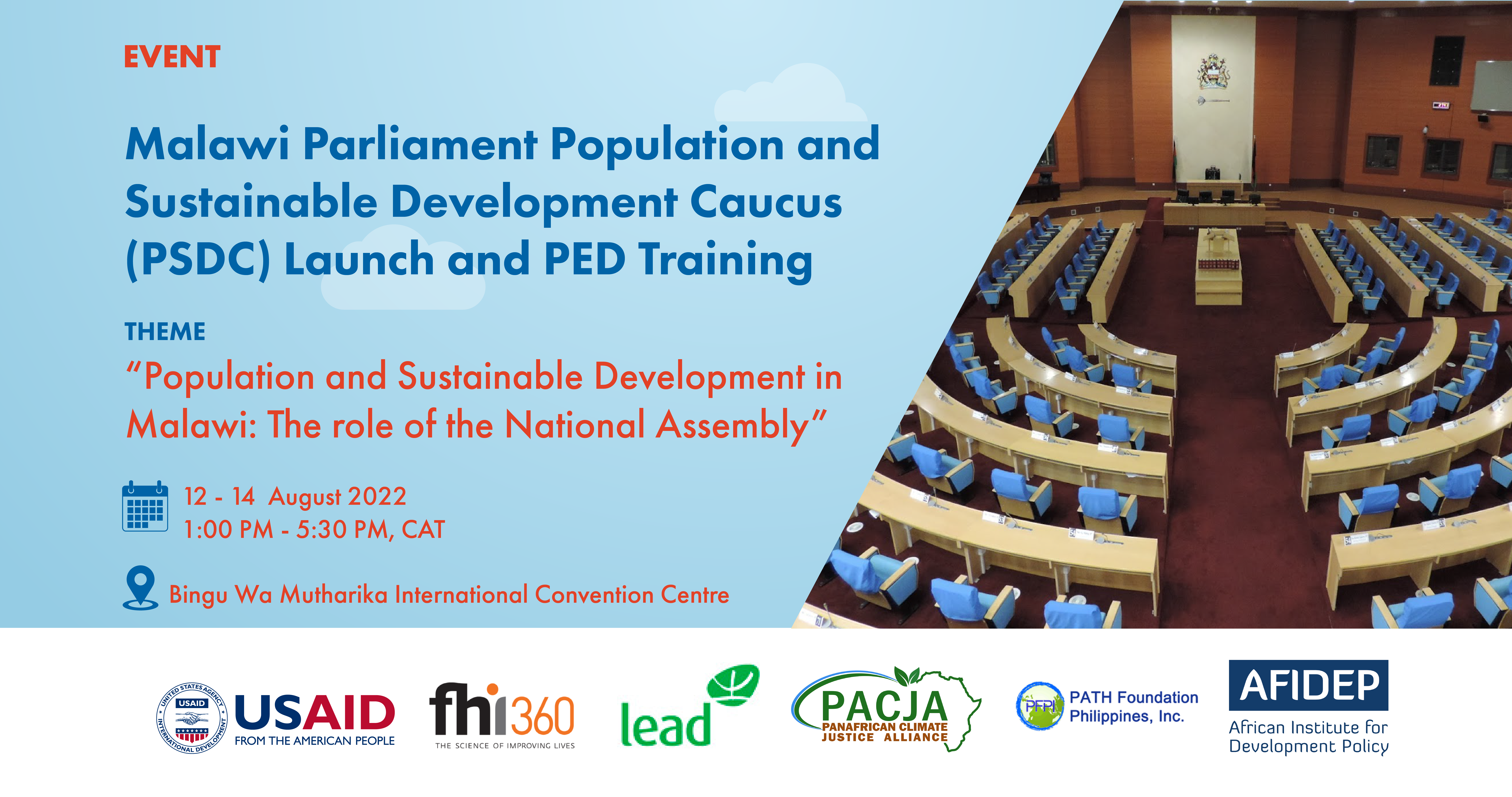Blogs

The National Assembly of Malawi, supported by the BUILD Project, will launch the Malawi Parliament Population and Sustainable Development Caucus (PSDC). Initially launched in 2017, the PSDC was expected to contribute to addressing the country’s population and development challenges through advocacy and legislation. However, the Caucus has not been active in recent years. Realizing the increasingly salient role of population in sustainable development, Members of Parliament in Malawi have decided to reactivate the population and development Caucus, which is now renamed Population and Sustainable Development Caucus (PSDC).
Details of the event are as follows:
Dates: 12th August 2022 from 1400 hrs CAT
Venue: Bingu International Conference Centre, Lilongwe, Malawi
Chief Guest: Rt Hon Catherine Hara, Speaker, National Assembly of Malawi
Malawi’s population stands at over 19.6 million people. The population is very youthful with 66% of our people under 25 years of age. The annual population growth rate is 2.9% per annum, driven by progress made in reducing death rates amidst a slowly declining high fertility rate of 4.2 children per woman. Projections show that if the trend continues, Malawi’s total population will double by 2040. presenting the country with challenges that may adversely impact socioeconomic transformation and sustainable development ambitions outlined in Malawi Vision 2063.
Malawi can leverage its youthful population as a springboard for social and economic growth and capitalize on the demographic dividend by making timely investments in family planning, health, education, enabling an environment for economic growth, job creation, and governance. The country’s long-term development blueprint, Malawi Vision 2063 (MW2063), acknowledges the salient role of population in sustainable development processes.
Achieving Vision 2063 requires engagement and support from stakeholders working across sectors toward attaining SDGs. Parliamentarians are key stakeholders in this process. The Malawi parliament is one of the signatories to Vision 2063 and has committed to supporting the realization of the Vision by passing the necessary laws and holding the Executive and non-state actors accountable in the implementation of the interventions that will catalyze and sustain the attainment of inclusive development.
It is essential for legislators to fully understand how the Population (including voluntary family planning and reproductive health), Environment and Development (PED) framework should form an integral part of Malawi’s development planning and budgeting. Thus PED practitioners should strengthen engagement with the National Assembly of Malawi to ensure that parliamentarians have current and adequate skills to prioritize PED integration into development policies, plans and budgets.
Following the PSDC launch, the BUILD Project intends to conduct capacity-building training for PSDC members from 13th to 14th August 2022 at the Bingu International Convention Centre. The training will strengthen the capacity of members of parliament to create a pool of champions who will advocate for policy reforms and mainstreaming of family planning/reproductive health, population, environment, and development into policies within the National Assembly of Malawi and other state circles.
About the BUILD Project
The African Institute for Development Policy (AFIDEP) and its partners, PATH Foundation Philippines, Inc. (PFPI), Leadership for Environment and Development (LEAD), Pan African Climate Justice Alliance (PACJA), and FHI 360, are implementing the Building Capacity for Integrated Family Planning (FP), Reproductive Health (RH), and Population, Environment, and Development (PED) Action (BUILD) project.
The BUILD Project to ensure decision-makers understand the cross-sectoral benefits of voluntary family planning and, in turn, implement policies and programs to help meet the demand for family planning and other development sector outcomes. The project also seeks to increase gender equality and promote youth empowerment as cross-cutting drivers for sustainable development. The project is working to achieve two results:
- Strengthened individual and institutional capacity in advocacy, policy communications, and negotiations.
- Increased commitment to cross-sectoral approaches to integrate population, the environment and climate change, food security and livelihoods, and governance.
Media Contacts
Oesi Thothe
Communications and Policy Engagement Manager,
African Institute for Development Policy,
Email: Oesi.Thothe@afidep.org

